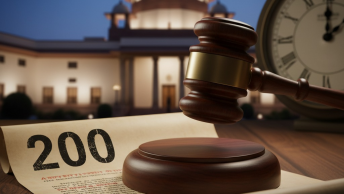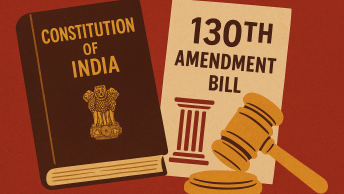INTRODUCTION
In March 2021, both Houses of the Parliament passed the Government of National Capital Territory of Delhi (Amendment) Bill, 2021 (hereinafter, GNCTD Bill) amidst massive furore. The President also gave his assent to the Bill immediately after its passing in the Rajya Sabha. The GNCTD Bill had faced strong political opposition in the Parliament as it worsens the existing power struggle between the elected government of Delhi and the centrally appointed administrative head, the Lieutenant Governor. This power tussle stems from Delhi’s unique federal arrangement, under Article 239AA of the Indian Constitution. The Article bestows upon Delhi the special status of a territory with a legislative assembly with the lieutenant governor as its administrator.
However, the inherent tensions created by the federal arrangement have been repeatedly highlighted since the Aam Aadmi Party (AAP) came into power in Delhi in 2015.With the Bharatiya Janta Party (BJP) having a supermajority at the central level, the political tensions between the two parties at the two respective federal levels of government has resulted in the deepening of the power struggle between the Lieutenant Governor and the Council of Ministers.
The Bill has been mired in controversies as it shifts the balance of power in favour of the Lieutenant Governor. It also goes against the decision of the Supreme Court in the case of Government of NCT of Delhi v. Union of India (2018) which categorically held that the elected government has primacy in all matters other than the enumerated exceptions under Article 239AA. Moreover, the Bill was passed in the Lok Sabha, without thorough deliberation or referral to a Select Committee as demanded by the opposition. Additionally, the Bill was passed in the Rajya Sabha by a voice vote, despite opposition parties protesting against it.
The Central Government has defended the Bill citing administrative efficiency, public accountability, and smoothening of the tensions between the Lieutenant Governor and the elected government. As per the government, the Bill aims to bring in cohesion between the present legal framework under the GNCTD Act, 1991 and the 2018 judgement of the Supreme Court.
THE 2021 AMENDMENT
The GNCTD Bill brings in the following four major changes to the federal arrangement in the NCT of Delhi –
Firstly, as per amendment to Section 21, which provides for “restrictions on laws passed by Legislative Assembly”, the term “Government” in any law passed by the Legislative Assembly shall refer to the Lieutenant Governor.
Secondly, as per the amendment to Section 24, the Lieutenant Governor cannot assent to, but can reserve for the consideration of the President, any Bill which incidentally covers any of the matters which falls outside the purview of the powers conferred on the Legislative Assembly.
Thirdly, an amendment to Section 33 mandates that the conduct of the Legislative Assembly cannot be inconsistent with the Rules of Procedure and Conduct of Business as in the Lok Sabha. Moreover, it adds a proviso that bars the Legislative Assembly from making any rules to enable itself or its Committees to consider the matter of day-to-day administration or make inquiries into administrative decisions. It also adds that any rule that contravenes this proviso before the commencement of the GNCTD Act, 2021 is void.
Lastly, a proviso has been inserted to Section 44 which states that in respect of conduct of business of the assembly, before taking any executive action in pursuance of the decision of the elected government, the opinion of the Lieutenant Governor is to be obtained in accordance with Article 239AA (4) of the Constitution, by a general or special order.
THE 2018 SUPREME COURT JUDGEMENT
In 2018, the Supreme Court ruled on the federal structure of Delhi. The five-judge Constitution Bench unanimously held in favour of the elected government, holding the Chief Minister, as opposed to the Lieutenant Governor, to be the executive head of the government. The Court held that the Lieutenant Governor must be informed of the decisions taken by the Council of Ministers by way of consultation, but there is no requirement of a concurrence for the same. The Lieutenant Governor does not have independent powers allowing them to keep files for themselves.
It held that the sui-generis hybrid status of Delhi was distinct from that of a Union Territory or a State. Hence, the Lieutenant Governor was to be considered an “administrator in a limited manner and not a state governor.” The constitutional scheme of Article 239AA was interpreted to establish a democratic and republican government for suiting the special needs of Delhi. Since, the federal structure of governance and the cabinet form of government form a part of the Basic Structure of the Constitution, it was held that the authority of Delhi’s elected government was to be respected.
However, the judgement has been criticised as it merely restores the original status quo of Delhi’s federal structure, albeit with some more clarity, without substantially resolving the power struggle between the elected government and the Lieutenant Governor. It fails to remove the ambiguities in language of Article 239AA and the Transaction Rules of Business. It also circumvents an analysis of the jurisdictional issues arising from the reserve subjects of land, policing and services.
DECONSTRUCTING THE AMENDMENT
Firstly, the Bill equates the elected government of Delhi with the Lieutenant Governor in all laws passed by the Legislative Assembly. This goes against the provisions of Article 239AA and the 2018 judgement which explicitly states that the Lieutenant Governor is a mere administrator and not the executive head. The centrally nominated administrator does not reflect the will of the people, and should not be used interchangeably with the government.
Secondly, the Bill orders that any executive action by the Assembly should seek opinion of the Lieutenant Governor. This essentially curbs the freedom enjoyed by a legislature under normal circumstances. Even though the GNCTD Act 1991 and the Transaction of Business Rules (TBR) 1993 provide for consultation and communication with the Lieutenant Governor, in practice, the provision might hinder the initiatives of the Delhi Assembly, as shown in the past.
Article 239AA (6) of the Constitution states that “the Council of Ministers shall be collectively responsible to the Legislative Assembly”, not the Governor. Moreover, the 2018 judgement explicitly provided that the requirement is not of concurrence, but the GNCTD Bill tends towards that direction. The Supreme Court had held that the Lieutenant Governor is not the same as a State Governor and does not have independent decision making power. Thus, as stated by the Court – “if a well deliberated legitimate decision of the Council of Ministers is not given effect to due to an attitude to differ on the part of the Lieutenant Governor, this would negate the principles of collective responsibility.”
Thirdly, the Bill allows the Lieutenant Governor to send to the President, a Bill passed by the Delhi Assembly which incidentally covers any subject matters falling outside the purview of the law making powers conferred on the Legislative Assembly. As per the present legal framework, the Assembly derives its powers from the Constitution and can pass a law on any matter for which it has legislative competence as long as it does not contradict a Parliament made law. If the Lieutenant Governor feels that the law is encroaching on a Parliament made law, the Bill is sent to the President for their assent. However, the GNCTD Bill brings in an additional level of scrutiny. Usually, the Legislative Assembly is allowed to make laws that might incidentally step outside its legislative competence as long as the encroachment with respect to the ‘pith and substance,’ i.e. the core subject matter and purpose of the law is not substantial. This is known as the doctrine of pith and substance which does not invalidate an incidental overlap with the powers of the other legislature.
However, the present GNCTD Bill allows the Lieutenant Governor to send a Bill for the President’s assent that might even incidentally overlap with matters falling outside the purview of the Legislative Assembly. This is antithetical to principles of federalism and upturns the doctrine of pith and substance.
Fourthly, the Bill bars the Delhi Assembly from making any rules to allow itself or its Committees to consider matters of administration and it declares void rules made in contravention of this provision. The proviso has a retrospective application that restricts the functioning of the Legislative Assembly. The oversight Committees are fundamental for the Delhi Assembly to perform its functions that involve scrutiny of administrative actions and decisions. Moreover, the Bill does not define what falls under “day to day administration” and “administrative decisions” for which it is barring the Assembly from making rules. This curtails and interferes with the executive powers of the Assembly that are coextensive with its legislative powers as under Article 239AA (3)(a) read with Article 239AA (4).
Lastly, the Bill mandates that the conduct of business in the Delhi Assembly will have to be consistent with Rules of Procedure and Conduct of Business in the Lok Sabha. The reasoning behind bringing in this requirement has not been specified by the Central government. There is no law that mandates uniformity in conduct of business and rules of procedure for legislatures. Thus, it is not clear why the Centre is barring the legislature from having its own rules of procedure and conduct of business. The Government has claimed that this was done to achieve structural clarity in the conduct and business of the government but how this brings in more clarity has not been specified.
CONCLUSION
Delhi’s special position as the capital of the country requires a re-imagination of its governance structure to strike a balance of federal power between the Centre’s nominated representation, the Lieutenant Governor and the elected government consisting of the Council of Ministers headed by the Chief Minister to develop a working relationship which will benefit the people of Delhi. By strengthening the powers of the Lieutenant Governor, the GNCTD Bill is creating a backdoor entry for the Central Government to interfere in functioning of the Delhi government.
The 2018 had judgement significantly helped establish synergy between them which enabled the elected government to introduce various new policies, especially during the COVID-19 pandemic. After the decision, the Constitutional bench referred the issues related to specific matters of dispute between the Lieutenant Governor and the Council of Ministers to another bench in 2019. This two judge bench gave a split verdict and referred the issues related to public services to a larger bench. Thus, we are yet to see how the power struggle between the elected government of Delhi and the Lieutenant Governor pans out in the future.







